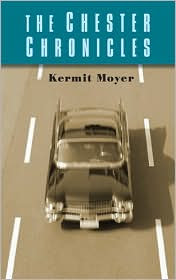 Kermit Moyer grew up an Army brat in the 1950s. He got his BA, his MA and his PhD in English from Northwestern University and in 1970 joined the faculty of American University in Washington, DC, where he taught literature and creative writing for the next 37 years. His short fiction has appeared in The Georgia Review, The Southern Review, The Sewanee Review, and The Hudson Review.
Kermit Moyer grew up an Army brat in the 1950s. He got his BA, his MA and his PhD in English from Northwestern University and in 1970 joined the faculty of American University in Washington, DC, where he taught literature and creative writing for the next 37 years. His short fiction has appeared in The Georgia Review, The Southern Review, The Sewanee Review, and The Hudson Review.His books include Tumbling, a collection of stories, and The Chester Chronicles, winner of the 2011 L.L. Winship PEN New England Fiction Award.
Recently I asked him what he was reading. His reply:
Lynn Bonasia's honey of a second novel, Summer Shift is a perfect summer read. I particularly loved the highly effective emotional close. I felt sure that Dan and Mary were made for each other and was sure, too, that in the end they would overcomeVisit Kermit Moyer's website.and straighten out whatever obstacles and misunderstandings were keeping them apart. But the delaying tactics work here just as they work in Pride and Prejudice (that classic piece of Chick Lit). If this was a movie, I’d cast Scott Bakula, who plays an out-of-work lothario actor in the TV series Men of a Certain Age, as Dan, and I guess Sandra Bullock as Mary. I love the restaurant stuff and the quirky neurological stuff (synesthesia and Parkinson’s) and Cape Cod as a place associated with little-known but nevertheless legendary artists. Also the themes of loss, false guilt, lies, and aging that are present throughout and that give the novel its serious ballast. If you like this novel, you should check out her first novel, too. It's called Some Assembly Required.
I've also just read an advance reader's copy of a novel entitled All Cry Chaos by Leonard Rosen that is due out this September from the Permanent Press and that transcends the genre or tradition in which it is nevertheless solidly located--that is, the police procedural detective novel as practiced by writers like Georges Simenon and P.D. James and Michael Dibdin. At the novel's center is Interpol agent HenriPoincare, and it's primarily the depth of Poincare's characterization that gives the novel its power. Henri Poincare is an original and fully realized human being, and the themes that emerge in this novel move from the merely procedural to the profoundly metaphysical. Ideas drawn from both science and religion come together to form the essential metaphor that links the solution to the mystery of the plot to the mystery of the cosmos. The author's sheer knowledgeability about the way the world works is also exceptional. The lines of suspense converge in the final pages in a way that draws the tension into an exquisite crescendo and then resolves the tension like the final bars of a symphony. The ending is exhilarating, and the second half of the novel totally fulfills the extraordinary promise of the first half. What is mysterious or hidden is revealed and made clear--as if Judgement Day had indeed arrived.
--Marshal Zeringue




